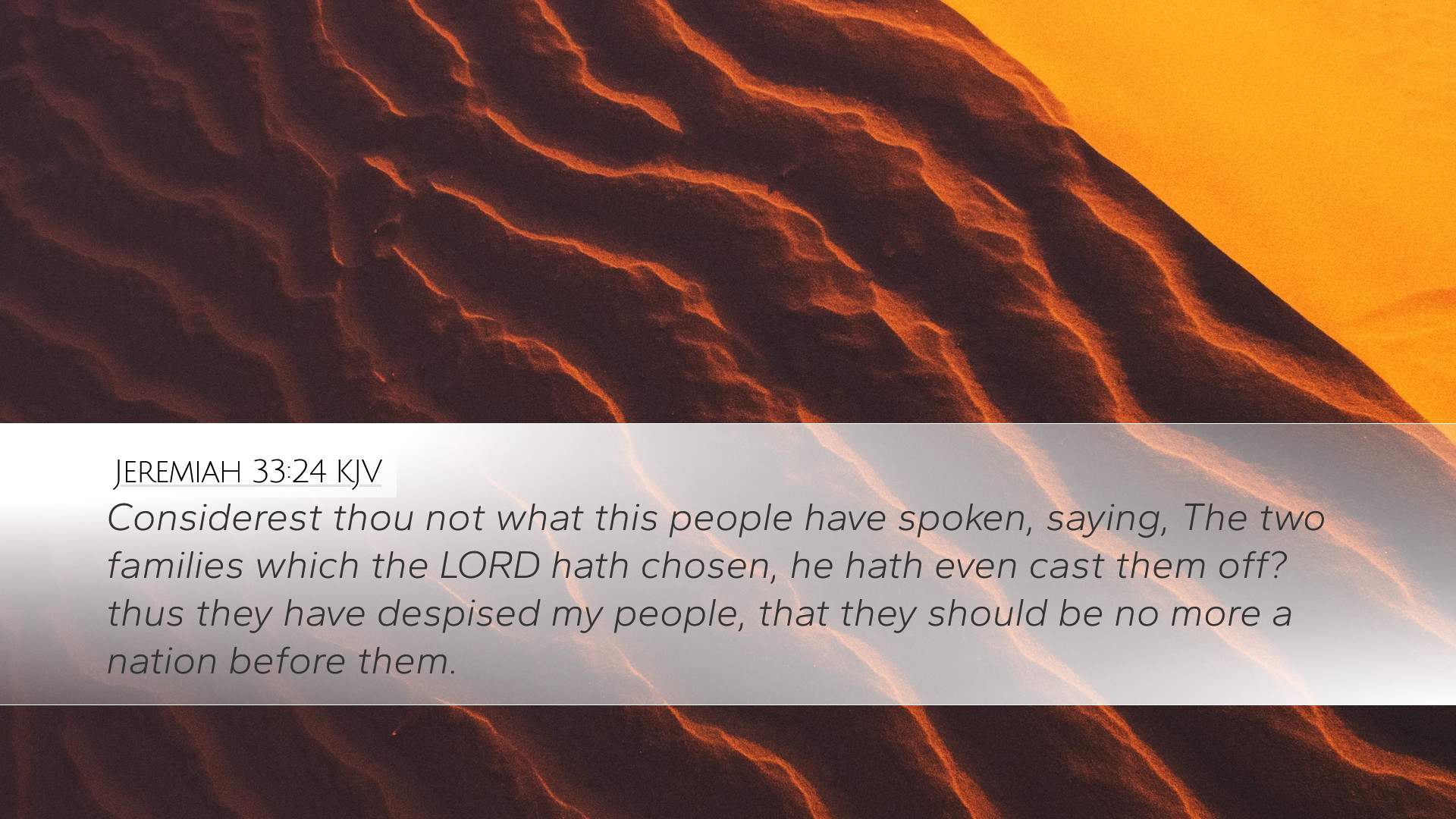Commentary on Jeremiah 33:24
Verse: "Considerest thou not what this people have spoken, saying, The two families which the Lord hath chosen, he hath even cast them off?" (Jeremiah 33:24)
This verse serves as a critical reflection on the people's perception of God's covenant. The context of Jeremiah's proclamation is essential for understanding its significance.
Contextual Analysis
Jeremiah 33 occurs within a broader narrative where the prophet is speaking to a people who are in distress, questioning their future and God's intentions. The preceding chapters establish a backdrop of despair, during which Jerusalem has fallen, and the people believe they have been forsaken by God.
Insights from Various Commentators
Matthew Henry
Henry emphasizes the confidence of the believer amidst turmoil. He remarks that God’s promises stand firm, regardless of the circumstances. The people’s perception of being “cast off” illustrates their waning faith in God’s covenant. Henry points out that God reminds the faithful of His steadfast nature, encouraging them to remember His past mercies and faithfulness.
Albert Barnes
Barnes provides a thorough examination of the “two families” mentioned in the text—the houses of Israel and Judah. He notes that these families represent the collective identity of God's chosen people, focusing on the importance of this union. Barnes stresses the repercussions of viewing themselves as cast off, indicating a profound misunderstanding of God's grace and intentions. He underscores that even in hardship, God's commitment to His people is unbroken; their restoration is assured.
Adam Clarke
Clarke highlights the impending fulfillment of God's promises, invoking the themes of hope and restoration. His analysis centers on the prophetic assurance that God will not abandon His people. Clarke elaborates on the significance of God’s response to the doubts expressed by the people. He notes that such reflections reveal a lack of spiritual insight into God’s overarching plan and covenantal faithfulness.
Theological Implications
- Covenant Theology: This verse invites theological discourse on covenant relationships, illustrating the tension between God's promises and human doubt. The reminder of His chosen status serves to renew hope.
- Faith in Adversity: The passage prompts a reflection on maintaining faith during trials. It challenges believers to resist despair by recalling past deliverances and trusting in God's future provisions.
- God's Sovereignty: The response to the doubt of Israel accentuates God's sovereign will and purpose. His unwavering commitment serves as a cornerstone for understanding divine providence amidst human frailty.
Practical Applications
This verse offers several profound lessons for modern readers:
- Understanding God’s Faithfulness: When faced with challenges, believers are encouraged to reflect on God's historical faithfulness as a means to combat feelings of abandonment.
- The Importance of Community: The acknowledgment of the “two families” reinforces the significance of community among believers. Unity in faith strengthens the resolve during times of doubt.
- Prophetic Assurance for Today: Just as Jeremiah spoke hope into a despairing situation, pastors and leaders are called to encourage their congregations, reminding them of God's eternal promises.
Conclusion
The message contained in Jeremiah 33:24 is one of profound hope and assurance amid uncertainty. The reflections from these esteemed commentators remind us that God's plans are not thwarted by human despair. For scholars and theologians, this verse not only calls for a deeper understanding of covenant dynamics but also serves as a framework for teaching resilience and faith in God’s enduring promises.


